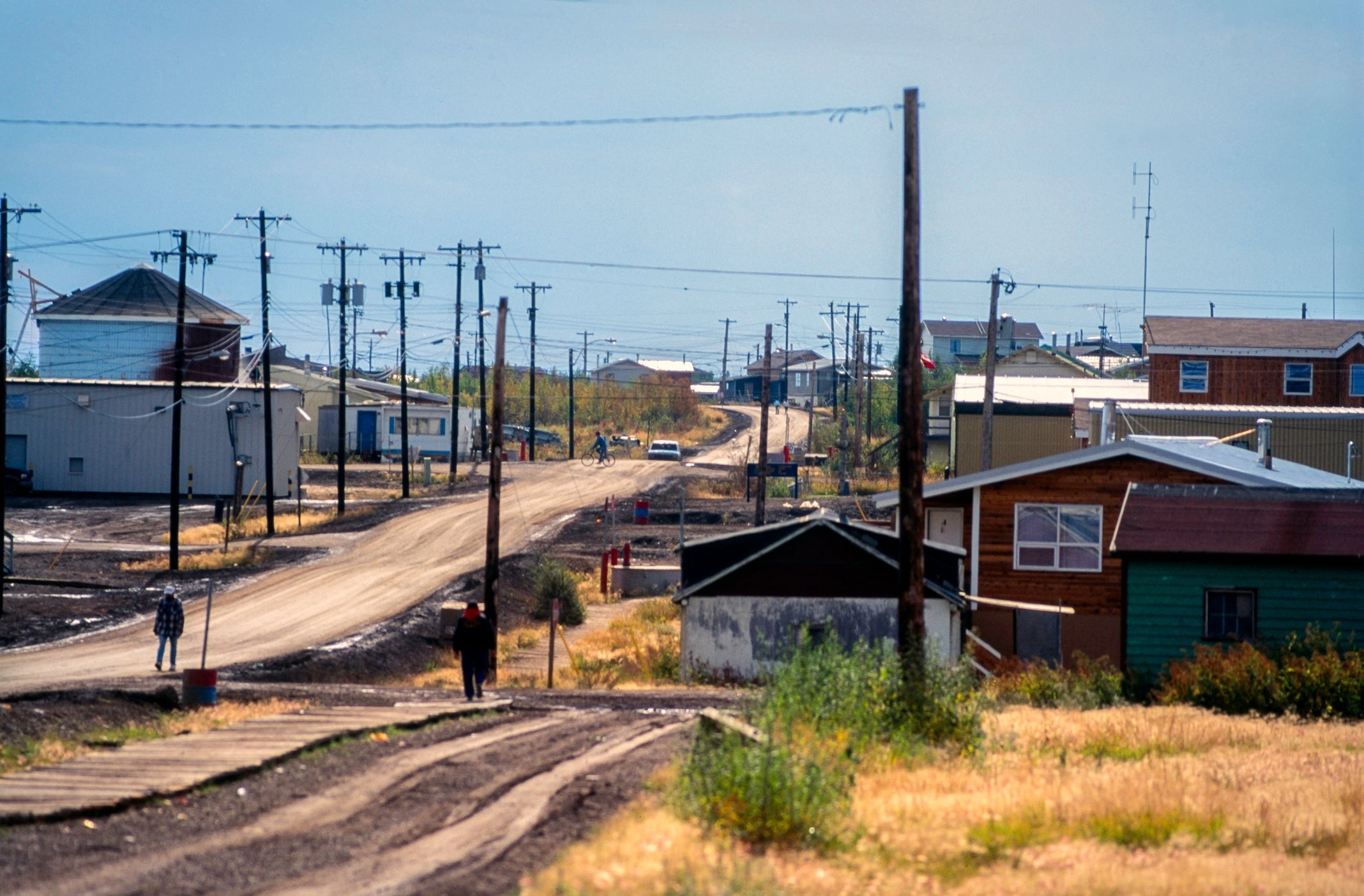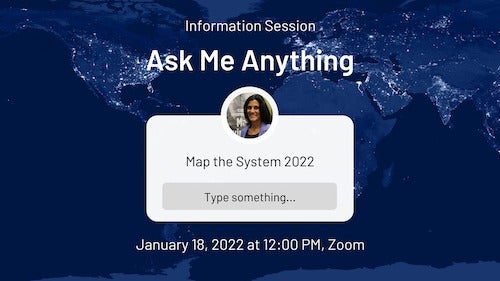- Virtual Equity, Diversity, Inclusion and Anti-racism workshop offerings for winter
- Indigenous communities face a higher risk of socioeconomic vulnerability due to flooding
- University updates protective equipment guidelines
- Water Institute, BlackBerry announce partnership to address global water-related challenges
- Map the System 2022 kicks off with information session
- Friday's notes
Editor:
Brandon Sweet
University Communications
bulletin@uwaterloo.ca
Virtual Equity, Diversity, Inclusion and Anti-racism workshop offerings for winter

A message from the Office of Equity, Diversity, Inclusion & Anti-racism (EDI-R).
The Office of Equity, Diversity, Inclusion & Anti-racism (EDI-R) is excited to launch our Winter 2022 workshop calendar. We invite you to view these terms offerings with the addition of three new learning and capacity building opportunities and ask that you register early for any of our workshops.
This term, our workshop opportunities include:
- Introduction to Equity
- 2SLGBTQ+ Fundamentals
- Unlearning the Binary: Fostering a Truly Trans-Inclusive Campus
- NEW: Disrupting & Decentering Whiteness - An intermediate level workshop open to all students, faculty and staff. This workshop explores how we can disrupt the centering of whiteness in higher education and unpack white supremacy cultures material effects and its harm on racialized students, faculty and staff. Offered on January 25 and March 24.
- NEW: Pathways for Addressing (with care) Disclosures of Racism - This introductory workshop will help students, faculty and staff develop a sense of accountability and understanding of the pervasive nature of racism within the Institution. This workshop will be openfor students only on February 17 and for faculty and staff only on March 10.
- NEW: Identifying & Uprooting Internalized Racism - Who is Canadian? Why are racialized individuals constantly othered and made to feel we don’t belong? This closed workshop is for University of Waterloo community members who are Indigenous, Black, racialized, who are grieving the racism in the world while investigating our own internalized racism. A closed workshop for students only will be offered on February 8. The closed workshop for faculty and staff will be offered on March 15.
If you have any questions about our offerings, or the registration process, please contact hrei.trainings@uwaterloo.ca.
Indigenous communities face a higher risk of socioeconomic vulnerability due to flooding

Fort McPherson, Northwest Territories, Canada - Getty Images.
Indigenous communities are at higher risk of hardship from climate-change-caused flooding because of pre-existing socioeconomic vulnerability, a new study shows.
The study’s findings also reveal that factors influencing socioeconomic vulnerability in Indigenous communities include the legacy of colonization, attributes of race and ethnicity, income, built environment, elderly populations, education, occupation, family structure, and access to resources.
The study, led by University of Waterloo researcher Liton Chakraborty, found that measuring socioeconomic vulnerability to flooding provides valuable information to support Indigenous flood risk management planning, especially under accelerating climate change.
“This is a first attempt in Canada to assess place-based social vulnerability and flood exposure for Indigenous populations at a national level,” Chakraborty said. “The study contributes to knowledge about socioeconomic factors that contribute to flood risk among First Nations, Métis, and Inuit peoples living on-reserve.”
The report captured the percentage of the population and number of residential properties in a 100-year flood zone. The results revealed “hotspots” where flood risk spatially coincided with socioeconomic disadvantage.
Chakraborty also noted that there are considerable data gaps limiting flood risk assessment in Canada and that the federal government should prioritize resources for identifying flood exposure in Indigenous communities. “Part of the considerations should be the dynamic range of geography, topography, and available data inputs from local scale determinations of flood risk,” he said.
The study, Leveraging Hazard, Exposure, and Social Vulnerability Data to Assess Flood Risk to Indigenous Communities in Canada, authored by Waterloo researchers Chakraborty, Jason Thistlethwaite, Andrea Minano, Daniel Henstra and Daniel Scott, was recently published in the International Journal of Disaster Risk Science.
University updates protective equipment guidelines

"To increase the protective factor of face coverings against the highly transmissible omicron variant, we are reminding all employees and students to wear a mask that meets the Public Health Agency of Canada’s (PHAC) recommendations in general, non-health care areas," wrote Kate Windsor, Director of the Safety Office in a memo circulated to employees earlier this week. "Supervisors should ensure that employees are provided with appropriate face coverings in respect of their work environment."
Windsor reminds campus that non-medical masks can help prevent the spread of COVID-19 similar to medical masks if they:
- fit well
- have multiple layers, including at least 2 layers of breathable tightly woven fabric, such as cotton and an effective middle filter layer
"Medical masks that are certified ASTM Level II provide good protection when worn properly," Windsor writes. "Medical masks are typically single use and disposable, but may be reused until visibly dirty, damp or damaged."
Masks are worn properly only if they cover the mouth, nose and chin and fit snugly. As per PHAC’s advice, ways to improve fit include:
- adjusting bands or ear loops and the flexible nosepiece
- tying knots in the ear loops and tucking the sides of the mask so that it lies flat
- layering a well-fitting non-medical cloth mask over a disposable mask
- keeping facial hair shaved or short, if possible
Two appropriate options for face coverings are available centrally at no cost to units for employees performing essential in-person work (including teaching), via Central Stores catalogue.
- Reusable, washable 3-layer cotton and polyester cloth face mask with filter pocket and adjustable ear loops. Order with 5-layer disposable filters; and
- Disposable medical grade ASTM Level II masks.
"Please order only what is needed for essential in-person activities – limits may apply," Windsor writes. Employees should bear in mind that supplies must be ordered by their manager/supervisor through Central Stores.
"As a reminder, where an employee is providing services to a person in any circumstance who is not wearing a mask or face covering and is not separated by plexiglass or some other impermeable barrier, the employee is required to wear appropriate PPE i.e., a medical grade mask as well as eye protection."
- Eye protection can include appropriate safety glasses/goggles or a face shield (available via Central Stores) and must:
- Fit properly and not interfere with the proper fit of a mask;
- Provide a barrier to splashes from the side; and
- Not create an additional hazard in relation to the type of work being performed.
"Please refer to the COVID-19 Health & Safety Guide for protective equipment requirements," Windsor's memo concludes. "Supervisors should update safety plans as necessary."
Water Institute, BlackBerry announce partnership to address global water-related challenges

The Water Institute and BlackBerry havelaunched a first-of-its-kind innovation research challenge for professors and students.
The Water Innovation Challenge invites new applications of BlackBerry technologies to address water-related challenges, including the cybersecurity of water systems, water emergencies, and Internet of Things (IoT) water management solutions.
In support of a mutual commitment to help ensure the availability and sustainable management of water, the Water Innovation Challenge will catalyze new research and technological innovation that advances the sustainability and water related United Nations Sustainable Development Goals (SDGs). Water resilience is critical for economic development, climate change, and healthy ecosystems.
To learn more about the Water Innovation Challenge, visit the Water Institute website.
Map the System 2022 kicks off with information session

Map the System 2022 is underway at the University of Waterloo, according to a note from the Centre for Peace Advancement at Conrad Grebel University College.
Students have until January 31, 2022 to register for this research competition for their chance to win up to $2,000 in cash prizes and compete at the virtual Canadian Final and Global Final at Oxford.
"Map the System asks you to select a social or environmental issue and to explore, probe, and research all the connecting elements and factors around it," the announcement says. "To help you learn more about the competition and systems mapping, the Kindred Credit Union Centre for Peace Advancement is hosting a Map the System Information Session on January 18, 2022 from 12:00 noon to 1:00 p.m. on Zoom. Registration is required."
Questions about the competition can be directed to UWaterloo Map the System Campus Lead, Leah Feor.
Other key competition dates in January include:
- January 25, 2022 – Map the System 2022 Launch Event featuring Nobel laureate Prof. Muhammad Yunus; and
- January 31, 2022 – Registration deadline.
Friday's notes
First off, a very Merry Christmas to those members of the University community who are celebrating Orthodox Christmas on January 7. The Eastern Orthodox Church and other bodies using the old Julian Calendar rather than the Gregorian Calendar celebrate the December 25 Christmas holiday on January 7. There's obviously a lot of history behind the reasons why the calendar dates differ, more than we could fit into a proper Daily Bulletin article, but you can find out more about the competing calendars online.
Additionally, Sikhs in our community and around the world will celebrate Guru Gobind Singh Jayanti on Sunday, January 9. This celebration honours the birth of Guru Gobind Singh, the tenth Sikh Guru who played a pivotal role in the development of Sikhism's faith and traditions.

The Warriors Athletics and Rec Virtual Open House will be held on Tuesday, January 11 from 3:00 p.m. to 3:30 p.m. "Learn how you can get active online with Warrior Rec as we begin the winter 2022 term," says a note from Athletics and Recreation. Sign up here.
By registering you enter yourself into a draw to win $50 from Jimmy's Feed Co.
Link of the day
When and Where to get support
Students can visit the Student Success Office online for supports including academic development, international student resources, immigration consulting, leadership development, exchange and study abroad, and opportunities to get involved.
Finance and Student Financial Services will be closed to in-person service in EC5 until further notice. Students, please visit the Centre in Needles Hall or contact Student Financial Services at the helpdesk.
Instructors looking for targeted support for developing online components for blended learning courses, transitioning remote to fully online courses, revising current online courses, and more please visit Agile Development | Centre for Extended Learning | University of Waterloo (uwaterloo.ca).
Instructors can visit the Keep Learning website to get support on adapting their teaching and learning plans for an online environment.
Course templates are available within your course in LEARN to help you build and edit your content and assignment pages quickly.
The following workshops, webinars, and events are offered by the KL team (CTE, CEL, ITMS, LIB):
- Independent Remote Course Design Essentials, self-directed, continuous self-enrollment course in LEARN.
- Independent Blended Course Design (iBlend), self-directed, ongoing
- Copyright Overview for Waterloo Instructors and Staff - self-directed, continuous self-enrollment course in LEARN.
Employees can access resources to help them work remotely, including managing University records and privacy of personal information. Here are some tips for staying healthy while working from home.
Stay informed about COVID cases on campus by consulting the COVID case tracker.
The Writing and Communication Centre has virtual services and programs to help undergrads, grad students, postdocs and faculty members with academic writing.
- Meet with writing advisors in one-to-one appointments to brainstorm, draft, revise, and polish. No time for an appointment? Try email tutoring for undergrads.
- Beat isolation and make writing progress at weekly Virtual Writing Cafés for grad students and faculty or PJ-Friendly Writing Groups for Undergrads.
- Take an online workshop or apply to our popular Dissertation Boot Camp program.
- Faculty can request custom in-class workshops for their courses, or the WCC can facilitate any existing workshops for student groups.
- Course-integrated support available. Attention faculty and instructors: The application form for Writing and Communication Centre course-integrated support is now available online. We offer five unique support streams for your courses including synchronous and asynchronous workshops and monitored discussion boards.
Co-op students can get help finding a job and find supports to successfully work remotely, develop new skills, access wellness and career information, and contact a co-op or career advisor.
The Centre for Career Action (CCA) is currently offering virtual services only. Questions about CCA's services? Live chat or call 519-888-4047 between 8:30 a.m. and 4:30 p.m. EST, Monday to Friday.
Drop-in to Warrior Virtual Study Halls on Wednesdays from 5:30 p.m. to 7:00 p.m. Come together in this virtual space to set goals and work independently or in groups each week.
Renison's English Language Institute continues to offer virtual events and workshops to help students practice their English language skills.
If you feel overwhelmed or anxious and need to talk to somebody, please contact the University’s Campus Wellness services, either Health Services or Counselling Services. You can also contact the University's Centre for Mental Health Research and Treatment. Good2Talk is a post-secondary student helpline available to all students.
The Library will continue to focus on digital resources and consultations as we start winter term with classes primarily online, though spaces will be open for drop-in individual study space, bookable individual study rooms, drop-in access to computers and printers, book pick-up services and IST Help Desk support. Special Collections & Archives and the Geospatial Centre will be accessible by appointment. Full details on current services and hours are available on the Library’s COVID-19 Update webpage.
The Faculty Association of the University of Waterloo (FAUW) continues to advocate for its members. Check out the FAUW blog for more information.
The University of Waterloo Staff Association (UWSA) continues to advocate for its members. Check out the UWSA blog for more information.
The Sexual Violence Prevention and Response Office (SVPRO) supports all members of the University of Waterloo campus community who have experienced, or been impacted, by sexual violence. This includes all students, staff, faculty and visitors on the main campus, the satellite campuses, and at the affiliated and federated Waterloo Institutes and Colleges. For support, email: svpro@uwaterloo.ca or visit the SVPRO website.
The Office of Indigenous Relations is a central hub that provides guidance, support, and resources to all Indigenous and non-Indigenous campus community members and oversees the University's Indigenization strategy.
The Waterloo Indigenous Student Centre, based at St. Paul’s University College, provides support and resources for Indigenous students, and educational outreach programs for the broader community, including lectures, and events.
WUSA supports for students:
Peer support - MATES, Glow Centre, RAISE, Women’s Centre - Visit https://wusa.ca/peersupport to book an appointment either in person or online for the Fall term.
Food Support Service food hampers are currently available from the Turnkey Desk 24/7 in the Student Life Centre. Drop off locations are also open again in SLC, DC, DP, SCH and all residences.
Co-op Connection all available online. Check https://wusa.ca for more details.
Centre for Academic Policy Support - CAPS is here to assist Waterloo undergraduates throughout their experience in navigating academic policy in the instances of filing petitions, grievances and appeals. Please contact them at caps@wusa.ca. More information is available.
WUSA Student Legal Protection Program- Seeking legal counsel can be intimidating, especially if it’s your first time facing a legal issue. The legal assistance helpline provides quick access to legal advice in any area of law, including criminal. Just call 1-833-202-4571.
Empower Me is a confidential mental health and wellness service that connects students with qualified counsellors 24/7. They can be reached at 1-833-628-5589.
GSA-UW supports for graduate students:
The Graduate Student Association (GSA-UW) supports students’ academic and social experience and promotes their well-being.
Advising and Support - The GSA advises graduate students experiencing challenges and can help with navigating university policies & filing a grievance, appeal, or petition.
Mental Health covered by the Health Plan - The GSA Health Plan now has an 80 per cent coverage rate (up to $800/year) for Mental Health Practitioners. Your plan includes coverage for psychologists, registered social workers, psychotherapists, and clinical counsellors.
Dental Care - The GSA Dental Plan covers 60 per cent to 70 per cent of your dental costs and by visiting dental professionals who are members of the Studentcare Networks, you can receive an additional 20 per cent to 30 per cent coverage.
Student Legal Protection Program - Your GSA fees give you access to unlimited legal advice, accessible via a toll-free helpline: +1-833-202-4571. This advice covers topics including housing disputes, employment disputes, and disputes with an academic institution.
The Graduate House: Open Monday to Friday 11:30 a.m. - 6:00 p.m. The Graduate House is an essential component of graduate student life, and we're working hard to make it available to students. The quality food with local ingredients you love is available for takeaway. And graduate students who paid their fees can still get discounts and free coffee.
BIPOC Student Collective - The Collective is a safe space for BIPOC LGBTQ2+ students and aims to foster intergenerational and peer-to-peer support and mentorship. Join the online Discord channel for solidary chats and drop-in sessions.
When and Where (but mostly when)
Warriors vs. Laurier Blood Donation Battle. Join our “Waterloo Warriors” team on the Blood.ca website or app. #ItsInYouToGive
Healthy Warriors at Home, free online programs including Nutrition Guides, Personal Training Consults, Health Webinars, Mindfulness Courses and On-demand Fitness. Sign up now.
Warrior Reset, starts January 10. Free online program with an active Warrior Rec membership. Includes 3 live classes/week, healthy habit lessons and personal check ins. Register by Sunday, January 9.
Warriors Athletics and Rec Virtual Open House, Tuesday, January 11. Find out how to get active online with Warrior Rec to start the winter 2022 term. One lucky attendee will win $50 from Jimmy’s Feed Co. Register in advance today.
NEW - Master of Taxation, Virtual Information Session, Friday, January 14, 11:00 a.m. To register visit www.mtax.ca.